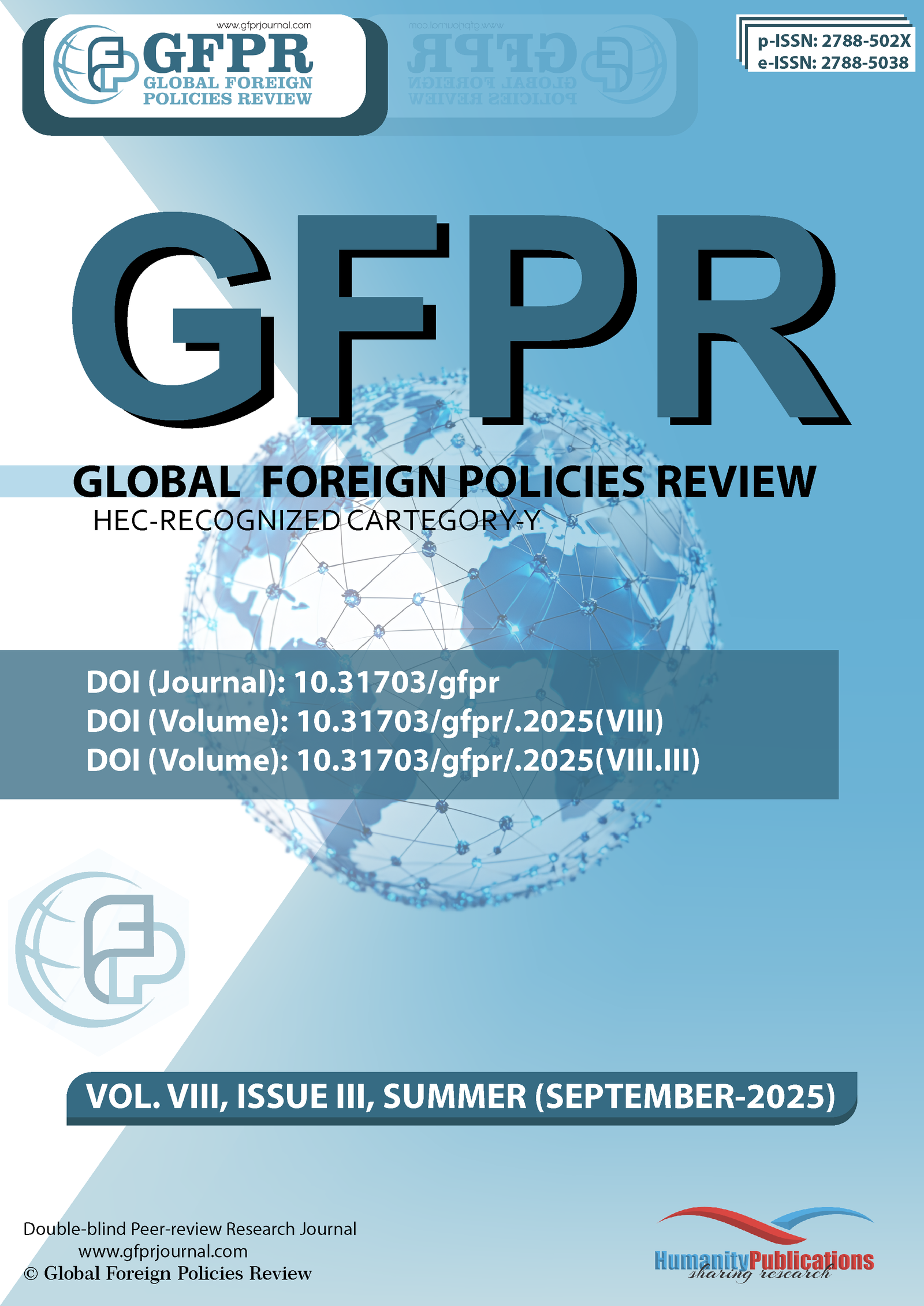01 - Diplomatic Complexity: Effects of Pakistan's Closer Relations with Russia on its
http://dx.doi.org/10.31703/gfpr.2023(VI-III).0110.31703/gfpr.2023(VI-III).01 Published : Sep 2023
The article explores the evolving dynamics of Pakistan's diplomatic relationships with Russia and the United States in the contemporary era. It delves into the multifaceted impacts of Pakistan's growing proximity to Russia on its traditional partnership with the United States. The shifting global landscape influenced by geopolitical realities, regional security concerns, and economic interests,... Details
-
Pakistan, Russia, United States, Imran Khan Tenure, Shehbaz Sharif Tenure, Foreign Policy, Challenges of Diplomacy
-
(1) Uroosa Ishfaq
Lecturer, Department of Political Science, Shaheed Benazir Bhutto Women University, Peshawar, KP, Pakistan.
(2) Kashif Ashfaq
Lecturer, Department of Political Science, Shaheed Benazir Bhutto Women University, Peshawar, KP, Pakistan.
(3) Hamza Ashfaq
Post Graduate Scholar, Department of International Relations, Abdul Wali Khan University, Mardan, KP, Pakistan.
02 - Colonial Missions To Africa: A Case Study of China's Secret Mission And New Poli
http://dx.doi.org/10.31703/gfpr.2023(VI-III).0210.31703/gfpr.2023(VI-III).02 Published : Sep 2023
The 19th and 20th centuries have been for European missions to Africa. The main goal of the European missions to Africa was to civilize and exploit the Africans in their own territories because they needed the resources of Africa. This paper demonstrates that the 21st century is also a century for China to invade and re-colonize Africa through a new policy of loans, aid, assistance, technology,... Details
-
Colonial-mission, Secret-mission, New-policy, Re-colonization
-
(1) Brel Grace Mangalala
Ph.D. Scholar & Assistant lecturer, Department of Foreign and Modern Languages, Faculty of Arts & Humanities, University of Marien Ngouabi, Brazzaville, Republic of the Congo.
03 - Kashmir Conflict after Article 370 and 35 A: Challenges and Options for Pakistan
http://dx.doi.org/10.31703/gfpr.2023(VI-III).0310.31703/gfpr.2023(VI-III).03 Published : Sep 2023
This research explores the complex dynamics of the Kashmir Conflict following the abrogation of Article 370 and Article 35A by the Indian government on August 5, 2019. The historical roots of the incessant dispute, stemming from the British partition of the Indian Sub-continent, set the stage for ongoing tensions between two regional arch-rivals, Pakistan and India over the region. The revocati... Details
-
Article 370, Article 35 A, Historical Grievances, Diplomatic Isolation, Human Right Concerns
-
(1) Nosherwan Adil
Lecturer, Department of International Relations, National University of Modern Languages, Islamabad, Pakistan.
(2) Muhammad Yasin Sultan Raja
Lecturer, Department of International Relations, National University of Modern Languages, Islamabad, Pakistan.
04 - The Role of US in Iran-Saudi Conflict: Implications on the Middle East
http://dx.doi.org/10.31703/gfpr.2023(VI-III).0410.31703/gfpr.2023(VI-III).04 Published : Sep 2023
The study examines the Iran-Saudi conflict and the role of the United States in shaping its dynamics. The study explores the United States' engagement in the region, analyzing its motivations,interests, and diplomatic interventions. It also delves into the military dimension of the United States'involvement, discussing strategic considerations and implications for regional security. Additionall... Details
-
Dynamics, United States Engagement, Sanctions, Economic Aspects, Balance of Power
-
(1) Roshni Najmul Ghani
Graduate, Department of Political Science, Women University, Mardan, KP, Pakistan.
(2) Marva Khan
Graduate, Department of Political Science, Women University, Mardan, KP, Pakistan.
(3) Hamza Ashfaq
Graduate, Department of International Relations, Abdul Wali Khan University Mardan, KPK Pakistan.
05 - Impact of Artificial Intelligence in Arms Race, Diplomacy, and Economy: A Case S
http://dx.doi.org/10.31703/gfpr.2023(VI-III).0510.31703/gfpr.2023(VI-III).05 Published : Sep 2023
In the contemporary era, the demand for Artificial Intelligence (AI) is paramount, with existing applications in weak AI seen in products like smartphones, employing features such as Siri, voice recognition, and image recognition. The proliferation of AI extends beyond consumer goods to impact the arms race, diplomacy, and the economy. The emergence of advanced AI models like ChatGPT has intens... Details
-
Artificial General Intelligence(AGI), International Relations, Digital Connectivity, Arms Race, Autonomous weapons, United Nations, United States of America, China
-
(1) Abdul Rauf
Undergraduate, Department of International Relations, National University of Modern Languages (NUML), Islamabad, Pakistan.
(2) Sajid Iqbal
Assistant Professor, Department of International Relations, National University of Modern Languages (NUML), Islamabad, Pakistan.

 Volume IX, Issue I (Winter 2026)
Volume IX, Issue I (Winter 2026)  Volume VIII, Issue IV (Fall 2025)
Volume VIII, Issue IV (Fall 2025)  Volume VIII, Issue III (Summer 2025)
Volume VIII, Issue III (Summer 2025)  Volume VIII, Issue II (Spring 2025)
Volume VIII, Issue II (Spring 2025)  Volume VIII, Issue I (Winter 2025)
Volume VIII, Issue I (Winter 2025)  Volume VII, Issue IV (Fall 2024)
Volume VII, Issue IV (Fall 2024)  Volume VII, Issue I (Winter 2024)
Volume VII, Issue I (Winter 2024)  Volume VI, Issue IV (Fall 2023)
Volume VI, Issue IV (Fall 2023)  Volume VI, Issue III (Summer 2023)
Volume VI, Issue III (Summer 2023)  Volume VI, Issue II (Spring 2023)
Volume VI, Issue II (Spring 2023)  Volume VI, Issue I (Winter 2023)
Volume VI, Issue I (Winter 2023)  Volume V, Issue IV (Fall 2022)
Volume V, Issue IV (Fall 2022)  Volume V, Issue III (Summer 2022)
Volume V, Issue III (Summer 2022)  Volume V, Issue II (Spring 2022)
Volume V, Issue II (Spring 2022)  Volume V, Issue I (Winter 2022)
Volume V, Issue I (Winter 2022)  Volume IV, Issue IV (Fall 2021)
Volume IV, Issue IV (Fall 2021)  Volume IV, Issue III (Summer 2021)
Volume IV, Issue III (Summer 2021)  Volume IV, Issue II (Spring 2021)
Volume IV, Issue II (Spring 2021)  Volume IV, Issue I (Winter 2021)
Volume IV, Issue I (Winter 2021)  Volume III, Issue I (Fall 2020)
Volume III, Issue I (Fall 2020)  Volume II, Issue I (Fall 2019)
Volume II, Issue I (Fall 2019)  Volume I, Issue I (Fall 2018)
Volume I, Issue I (Fall 2018)